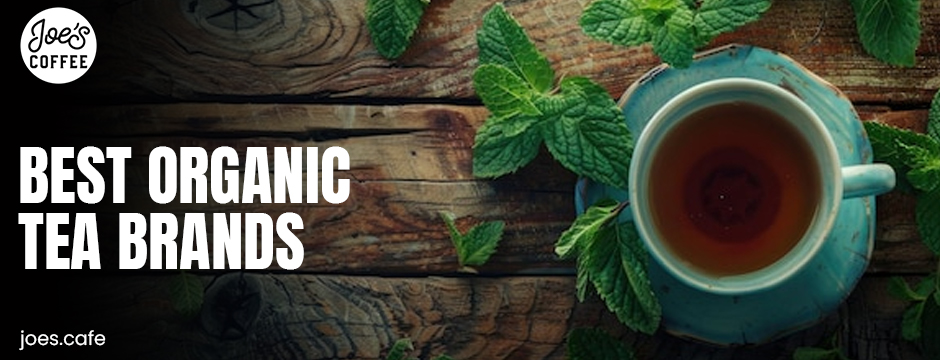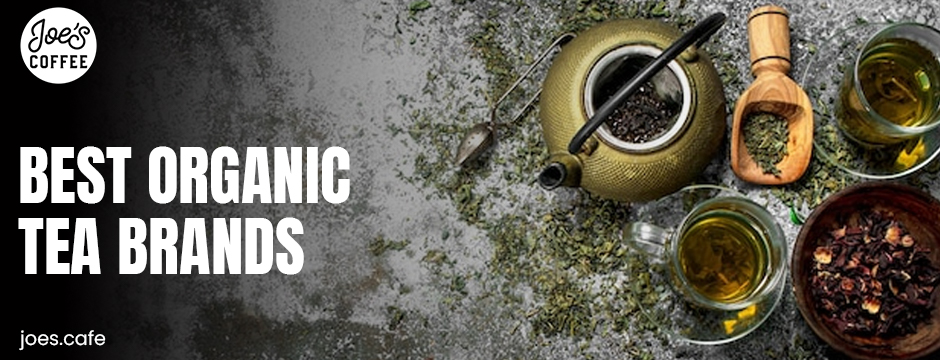Tea has always been a drink that represents comfort, clarity and simple pleasure. When brewed correctly, a cup of tea delivers layers of aroma, subtle sweetness, gentle bitterness and soothing warmth. Over the last decade, organic tea has grown in popularity among people who want a cleaner, purer drink. This growth has pushed the best organic tea brands to focus on something that matters more than anything: protecting flavor.
Organic tea is not only about avoiding synthetic pesticides. It is a complete approach to cultivation, harvesting and processing that keeps the natural taste of the leaves intact. When you sip an organic herbal tea, a fine green tea or a delicate white tea, you are tasting the true character of the plant. Achieving that level of purity takes expertise and careful attention at every stage.
This blog explores how the best organic tea brands protect flavor and maintain a high standard of quality from the field to your cup.

The Importance of Organic Cultivation
Tea flavor starts long before the leaves ever reach a teapot. It begins on farms that follow organic standards. The best organic tea brands work with growers who avoid synthetic fertilizers, pesticides, fungicides and herbicides. These chemicals can alter the natural chemistry of tea leaves. They also leave residues that can affect aroma and taste.
Organic tea is grown in clean soil enriched with compost, natural minerals and plant-based nutrients. Soil that is alive with microorganisms helps tea plants develop stronger roots and healthier leaves. Healthy leaves produce rich essential oils and fuller aromatic profiles.
Organic farms often rely on shade-grown methods as well. When tea plants grow under trees or in filtered sunlight, they develop slower. Slow growth allows for more concentrated flavor. Shade-grown teas are known for depth, smoothness and a more rounded finish.
Why Altitude Matters for Flavor
Many organic tea farms sit on mountain slopes. Higher altitudes create cooler temperatures, misty mornings and slow leaf growth. This environment results in leaves with stronger aromas and a natural sweetness that cannot be recreated artificially.
Teas like organic matcha, organic jasmine green tea and organic English Breakfast varieties taste fuller and smoother because they come from leaves grown under these conditions. The best tea brands organic always highlight their growing region because it directly influences flavor.
Selective Plucking and Fresh Harvesting
Hand-plucking is still considered the gold standard in the tea world. Machines can damage leaves and cause premature oxidation. The best organic tea brands depend on skilled tea pickers who select only the top two leaves and a bud. These parts of the plant have the highest concentration of essential oils.
Freshly harvested leaves must be processed quickly. Any delay can cause the leaves to wilt or lose moisture. This affects both the fragrance and final taste. Organic tea producers prioritise small-batch harvesting to maintain quality.
Minimal Processing to Preserve Aroma
Organic tea producers use minimal processing methods to keep the leaves as natural as possible. Green teas like Yuzu Peach Green, Jasmine, Jade Cloud and Matcha Super Green maintain their grassy and sweet flavours because they undergo careful steaming or pan-firing to stop oxidation.
Herbal teas such as Chamomile Medley, Lavender Mint, Blueberry Hibiscus, Turmeric Ginger, Chili Mango and Peppermint are dried slowly at low temperatures. This preserves their oils and prevents flavor loss.
Black teas like English Breakfast, Earl Grey, Masala Chai and Black Limon go through controlled oxidation. Proper oxidation deepens the flavor without creating bitterness. Organic producers monitor temperature, moisture and airflow during this stage to ensure consistency across batches.
Using Only Whole Leaves and Pure Botanicals
One of the most important ways the best organic tea brands protect flavor is by using whole leaves. Whole-leaf teas preserve more nutrients and essential oils. When tea leaves break apart into dust or small particles, they can lose aroma and become flat.
High-quality organic tea brands choose real dried fruit, flowers and herbs. This is important for teas like:
- Strawberry Tulsi
- Peppermint
- Lavender Mint
- Chamomile Medley
- Blueberry Hibiscus
- Masala Chai
Using pure ingredients ensures that every cup tastes exactly as it should.
Protecting Flavor Through Clean Water and Proper Brewing
Even the best organic teas can taste dull if brewed incorrectly. Many top brands educate customers about water temperature, steeping time and tea quantity. Green tea becomes bitter if brewed with boiling water. Herbal teas need more time to release full flavor. Black teas benefit from a slightly longer steep.
Providing brewing instructions helps customers get the most out of each cup. It also protects the brand’s reputation because customers experience the full taste intended by the growers and processors.
Packaging That Locks In Freshness
Exposure to moisture, air and light can ruin tea flavor. The best tea brands organic invest in packaging that shields the leaves from environmental damage. They use:
- Airtight pouches
- Recyclable tins
- UV-resistant containers
- Vacuum-sealed bags
This ensures that the aroma stays vibrant from the day it is packed to the day it is brewed.
Many organic tea companies include harvest dates or “packed on” labels to show customers exactly how fresh the tea is. Freshness is a key factor in flavor. When tea is consumed close to its harvest date, the taste is more dynamic.
Avoiding Flavor Additives and Artificial Enhancers
Organic tea brands rely on natural flavor sources, not chemical additives. Artificial flavors can create harsh or overly sweet notes that overpower the tea. Organic producers focus on real ingredients and authentic taste.
When you sip a cup of organic Earl Grey, for example, the citrus notes should come from natural bergamot rather than synthetic oils. When drinking a flavored herbal tea, the fruit aroma should come from actual fruit pieces rather than lab-made fragrances.
This commitment keeps the flavor clean and true to nature.

Sustainable Farming Creates Better-Tasting Tea
Sustainability and flavor go hand in hand. Healthy ecosystems grow healthy plants. Brands that prioritise biodiversity, natural pest control and traditional farming techniques end up producing richer teas.
Farmers often plant companion crops like lemongrass or mint to repel insects naturally. These plants also help maintain soil minerals and moisture. Over time, this results in tea plants with more vibrant flavors and stronger resilience.
Sustainable farms also avoid monocropping. When only tea is grown on large stretches of land, the soil becomes depleted. Mixed-crop farming ensures nutrients are replenished throughout the year.
Small-Batch Roasting and Blending
Blending is an art. Organic tea blends that taste balanced come from teams who understand how each herb, leaf or flower interacts with heat, moisture and other ingredients.
Small-batch roasting prevents burning or uneven drying. This is particularly important for teas with spices, such as Masala Chai or Mediterranean-style herbal blends. When roasted gently, spices release warm, earthy and sweet notes that deepen with each sip.
How Storage Conditions Maintain Taste
Even the best organic tea brands rely on proper storage after production. High temperatures, humidity and strong sunlight can dull tea flavor. Many companies store their tea in climate-controlled facilities with stable humidity.
Retailers and cafes that serve premium organic tea also follow strict storage standards. They rotate stock regularly, keep teas sealed, and ensure they are consumed within the recommended time frame.
This is crucial for maintaining flavor integrity.
Our Commitment at Joe’s Cafe
At Joe’s Cafe, we take flavor seriously. Our organic teas come from trusted growers who follow clean farming practices and place natural taste at the center of every step. We serve a wide variety of organic teas including Peppermint, Chamomile Medley, Lavender Mint, Turmeric Ginger, Blueberry Hibiscus, Strawberry Tulsi, Yuzu Peach Green, Jasmine, Jade Cloud, Matcha Super Green, English Breakfast, Earl Grey, Black Limon and Masala Chai. We brew each cup fresh and follow the correct steeping methods so that our customers enjoy the full character of every leaf. Our focus has always been purity, aroma and authenticity because we believe that great tea should never be compromised.
Conclusion
Protecting flavor is a detailed process that involves careful cultivation, thoughtful harvesting, gentle processing and responsible packaging. The best tea brands organic do much more than avoid chemical treatments. They preserve the true taste of the tea plant by respecting nature and following traditions that have shaped tea culture for centuries.
When you choose organic tea, you are choosing cleaner soil, better farming practices and a richer, more authentic cup. Whether you enjoy green, black, herbal or white tea, organic options allow you to taste the natural essence of every ingredient.
If you want the purest expression of tea, always look for the brands that prioritise freshness, sustainability and integrity at every stage.


